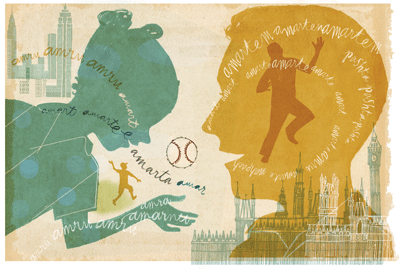Being Jewish
Feature
Family
Field, and Chant, of Dreams

In the fall of 1972, when I was starting the third grade, I moved to London with my parents and my brothers for my father’s sabbatical.
England—the land of cricket and scones, of the changing of the guard. However, I was enrolled at the American School in London, where, as if to prove I was a true expatriate, I signed up for Little League baseball.
That year, I played more baseball than I ever had before and ever would again in my life.
And studied less Hebrew. Because back in New York, from where I had moved, I had attended a Hebrew day school. I had a double curriculum: English and math and science and social studies, but also Bible and prophets and Hebrew language. Not so at the American School in London, where, when it came to Jewish studies, I was on my own. So my father, the son of an Orthodox rabbi, got the Jewish studies curriculum from my former school and told my brothers and me that he would be our tutor.
We were not enthusiastic. We already had enough school without having to have more school. But my father exclaimed, “Do you realize how far behind you’ll be when you get back?” That was the chorus that rang throughout our year, a year when, sure, I got to play baseball and see the queen, but what did that matter when I would return to New York an ignoramus? I came to think that if I did not buckle down, my future would be shot and I would rue the day I set foot in London.
Every Saturday on the walk to synagogue, my father would have my brothers and me conjugate Hebrew verbs. It was like a song, following the rhythm of our moving feet—amartee, amarta, amart, amar, amra, amarnu, amartem, amarten, amru. Then we would switch to the present tense, and to the future.
If we studied Hebrew with my father, he agreed to play baseball with us. But how much studying in return for how much baseball? It seemed to us that we were always learning Hebrew and never playing baseball, and, to my father, that we were always out playing and never learning any Hebrew.
One of the things my father did that year was teach me to chant from the Torah. I can still hear him singing the cantillation notes: “Mahpakh pashta, and down and up, and down and up.” The section of the Torah I chose to chant was the story of the binding of Isaac, and the irony is not lost on me, looking back. I was in my own bind, sitting in the dining room learning the cantillation notes when I wanted to be outdoors playing.
When I returned to New York the following year I was so far ahead in Jewish studies that I was bored all the way until high school. And when it came time for my classmates to learn the Torah cantillation, I was allowed to goof off in the back of the room.
“What do you know,” I told my brothers. “He wasn’t such a bad tutor, after all.”
Years later, I announced to my own 9-year-old, who goes to Jewish day school herself, that I was going to teach her to chant from the Torah. We would do it every Wednesday as a regular afterschool activity. My father had died recently, and I missed him at that moment, missed seeing the pleasure he would feel at watching this ritual get passed down.
My daughter agreed, but she wanted to know what she would get in return: “Can’t we do something fun?”
“Like what?”
“How about we play catch?”
I do not believe in telepathy. But I swear I never told Orly about my arrangement with my father. It was not until she had made her request that I admitted that I, too, had bargained with my father, that I had offered him my half-divided attention in return for him playing ball with me.
She seemed pleased by the symmetry and was happy to replicate what I had done 40 years ago and thousands of miles away.
So, every Wednesday afternoon at 4 o’clock, we sit in the living room with our cantillation notes. It is not long before I hear my daughter’s voice, an echo of my own voice from years ago. “Is it time to play?” she asks. “How long before we can go out?”
Joshua Henkin is the author, most recently, of the novel The World Without You (Vintage Contemporaries), winner of the 2012 Edward Lewis Wallant Award for Jewish American Fiction and finalist for the 2012 National Jewish Book Award. He speaks to book groups and can be reached at www.joshuahenkin.com.









 Facebook
Facebook Instagram
Instagram Twitter
Twitter
Leave a Reply